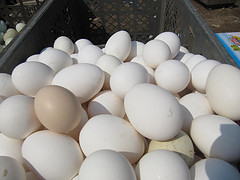
flickr.com/ivanwalsh
Nutritional supplements have become a way of life for many individuals. A peek into an average pantry will show as many supplemental products as actual food items. One of the most well-known supplements is lecithin.
What is Lecithin?
The phrase lecithin can actually denote two separate meanings. In biochemistry and related sciences, however, lecithin is a synonym for phosphatidyl choline. This is the major lipid component in biological membranes, like the cell membranes of humans or cell walls of plants. On the other hand, commercial lecithin, is a natural mixture of neutral and polar lipids. This mixture can include sterols, glyolipids, triglycerides and small quantities of fatty acids, sphingolipids and carbohydrates. The polar lipid, popular as phosphatidyl choline, is found in concentrations of 20 to 90% in commercial lecithin.
Where does lecithin originate?
Lecithin is discovered naturally in a number of sources. Lecithin that contains phosphatidyl choline is generally found in vegetable sources, although it may also come from microbial and animal sources. The majority of commercial lecithin found on the market today come from grape and sunflower seeds. In commercially produced plant lecithins, the most ordinary source is soybeans.
Maurice Gobley, a French scientist, discovered lecithin after it was first extracted from an egg yolk in 1846. In 1850, the compound was given its present name from the term “lekithos” which is Greek for “egg yolk.” For several years after that, commercially sold organic lecithin was obtained entirely from eggs. However, by the 1930s, soybeans had become the primary source of lecithin derived for commercial use. Nowadays, egg yolks are not considered as a major source of lecithin in nutritional supplements. The reason may be that lecithins obtained from plants are “GRAS”, or generally regarded as safe.
Who needs lecithin supplements?
Generally, lecithin is a substance that is synthesized from food and used by the human body. For this reason, lecithin is not considered to be an “essential nutrient” as the body can always acquire an additional supply of lecithin from its diet. As a matter of fact, people rarely suffer from lecithin deficiency. Even so, a steady supply of lecithin is useful for our bodies, and allows us to take full advantage of the benefits.
Lecithin is naturally found in the foods that we eat, particularly rich foods like egg yolk, soybeans, fish, grains, wheat germ, legumes, yeast and peanuts. Normally, the compound can also be taken as a supplement. Lecithin capsules, powder and granules is sold in many drug and health food stores, and is sometimes marketed to dieters as a supplement to promote weight loss. Lecithin is commonly combined into health shakes or taken in pill form.
What are the advantages of lecithin?
There are many health claims attributed to lecithin, including:
* Better liver and cell function
* Improved cardiovascular health
* Healthy hair and skin
* Improved reproduction and child development
* Successful treatment for gallstones
* Improved memory, learning and reaction time
* Arthritis relief
* Better cell communication
* Increased muscle endurance and physical performance
Like many of the nutritional supplements that have become so famous these days, lecithin can contribute to overall health. Discuss the advantages of lecithin before adding the supplements to your diet.
Tagged with: lecithin benefits • lecithin overview
Filed under: Lecithin